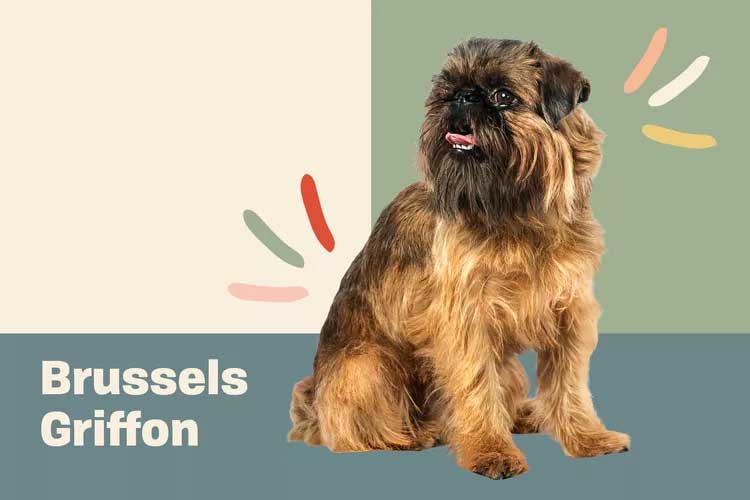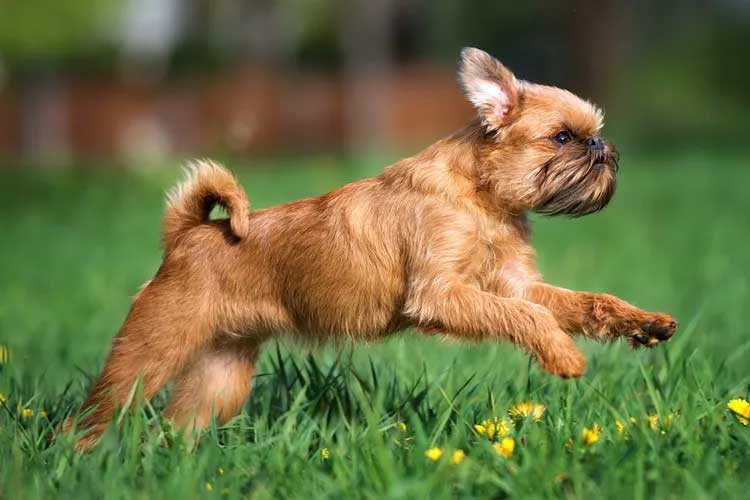Brussels griffons are smart and friendly little dogs with tons of personality, perfect for families or households of just about any size—including those with other dogs or cats. Learn more about living with Brussels griffons.

Brussels Griffon Overview
| OFFICIAL NAME | Brussels Griffon |
| COMMON NAME | Brussels Griffon |
| PET HEIGHT | 7 to 10 inches |
| PET WEIGHT | 8 to 10 pounds |
| LIFESPAN | 12 to 15 years |
| GOOD WITH | cats, children, dogs, families, seniors |
| TEMPERAMENT | anxious, friendly, outgoing, playful |
| INTELLIGENCE | high |
| SHEDDING AMOUNT | seasonal |
| EXERCISE NEEDS | medium |
| ENERGY LEVEL | active |
| VOCAL LEVEL | frequent |
| DROOL AMOUNT | low |
| BREED GROUP | toy |
| BREED SIZE | small (0-25 lbs.) |
| COAT LENGTH | medium, short |
| COLORS | black, blue, brown / chocolate / liver, red |
| PATTERNS | bicolor, black and tan |
| OTHER TRAITS | apartment-friendly, easy to train, good for first-time pet owners, good hiking companion, high potential for weight gain, high prey drive, loves water, prone to health issues, strong loyalty tendencies |
The Brussels griffon is a great little pal of a dog with personality plus. Smart, loyal, eager to please and ready for a good romp, this breed is a great family dog. Brussels griffons come with two types of coats: a smooth coat, which requires little grooming, or the rough coat with a distinctive beard and shaggy hair, which has higher grooming needs.
Like all flat-faced breeds, the Brussels griffon is susceptible to a number of respiratory conditions, and there are a few other health concerns to be aware of before owning one. Overall, though, this breed makes a loyal and affectionate companion, and it's easy to see why the breed is so popular.
Appearance
Part of the toy group of breeds, the Brussels griffon is a pint-sized companion who rarely gets taller than 10 inches and weighs around 10 pounds. Rough-coated Brussels griffons are known for their rather hipster-looking beards and longer shaggy fur, but the smooth-coated type has short hair and looks a little more pug-like.
Brussels griffons come in red, black, black and tan, or belge—a mix of black and reddish-brown. Their eyes are typically black, large, and expressive, though occasionally blue eyes do appear in the breed.
Temperament
Lorene Vickers-Smith, AKC-accredited breeder and author of The Brussels Griffon: An Owner's Guide to a Happy Healthy Pet, describes living with Brussels griffons as incredible."My dogs are extremely loving," she says. "They follow me around, and as soon as I sit down they climb onto my lap. They cue their behavior off my moods and are very perceptive."
Brussels griffons have a lot of energy and are highly intelligent—meaning that they are easy to train and are well-suited to obedience and agility sports. As long as you're willing to give them a good walk and plenty of playtime, they should be mellow at home despite their energetic personality.

They're good with children, other dogs, and family cats—but you should be careful of pet rabbits, rodents, and birds because their terrier instincts mean they have a strong prey drive.
"They're super friendly, great family dogs, and very adaptable to lots of people," Ali Mason, DVM, a medical coach with Pathway Vet Alliance, says. "The Brussels griffon is just a great dog in general."
Living Needs
The Brussels griffon is well-suited to pretty much any living situation. Sure, a fenced-in yard to run around in would be nice, but it's not essential."They're good apartment dogs, but they do still need a fair amount of exercise to keep them in shape, happy, and stimulated," Mason says. This could mean a couple of 30-minute walks per day, or playing ball inside or at the dog park if you don't have a yard.
These dogs are easygoing and adapt well to the energy level of their owners.
"They enjoy lying around on a pillow being pampered like royalty, but on the other hand they're ready to go if you want to go for a walk or do anything. They want to be part of your family," Vickers-Smith says. "They've got the energy to go on long hikes, but they like lazing around too."
Because these dogs are so attached to their owners and want to be with them all the time, separation anxiety can be a problem. Brussels griffons are probably not the breed for you if you need to leave your pets alone for extended periods.
Care
Grooming needs vary for the two types of this breed. The smooth-coated Brussels griffon requires only a weekly brushing and the occasional bath, except during seasonal shedding (usually in the spring and the fall) when daily bushing is advised for the week or so that it takes for them to blow their coat.The rough-coated Brussels griffon does not shed much but does have slightly higher grooming needs. To stay neat and tidy, that adorable beard and shaggier hair require clipping by either a groomer or by their owner. And this type of coat will benefit from more frequent brushing.
Mason says griffons need their teeth brushed daily, as their facial structure makes them more predisposed to periodontal disease. "They also need yearly dental cleaning under anesthesia," she advises.

Regular exercise is a must if you want to keep your Brussels griffon healthy. Unfortunately, with toy breeds who are happy to just snuggle on a lap, it may not be obvious that they do want to get out and walk. Mason says this breed has a tendency to put on weight without that regular exercise.
Socially, Brussels griffons love their people but will happily play with other dogs too. They're friendly and companionable, and just love being wherever their owner is, in any situation.
Early and consistent training with Brussels griffons brings fast rewards.
"All these dogs think about is how they can please you, so if you do the work from an early age they're easy to train with lots of positive reinforcement," Vickers-Smith says.
House training can be slow, but Vickers-Smith cautions that often owners have unrealistic expectations. "People aren't considering how hard it is for a young dog to hold their bladder at that age, or how small that bladder must be."
Health
That adorable smushed-in face that griffons have makes them susceptible to brachycephalic syndrome, which can lead to breathing issues (and can mean that your dog will snore). "That can cause a lot of problems, and they may need surgery to fix their elongated soft palate, open up their airways, remove obstructions, and help them breathe easier," Mason says.Griffons may also have issues with their knees. "They can get luxating patella, where their kneecaps can slide internally and pop out of place," Mason says. "This doesn't always need surgery to fix, but a lot of times griffons become overweight and then it can lead to arthritis and secondary knee ligament rupture. Sometimes in this case surgery is required, but a lot of times this condition can be medically managed with us keeping them slim and active and giving them joint supplements."
Cataracts are one of several potential Brussels griffon eye problems. The breed can also be prone to hip dysplasia and heart murmurs. All of these are issues that reputable Brussels griffon breeders will screen for.

Despite this list of potential issues, keep in mind that your griffon might not suffer from any of them. "They're basically pretty darn hardy and pretty healthy dogs," Vickers-Smith says. "But it's always wise to ask your breeder questions about these issues in their dogs' lineage."
History
Griffons got their start as rat-catchers, according to the American Brussels Griffon Association (ABGA). The Brussels griffon as we know it was first bred in Belgium in the mid-1800s, when the local terrier-type dogs were bred with various other breeds. Out of this came the flat-faced and bearded Brussels griffon, and so began the breed's journey from working dog to loyal little companion.The breed was favored by the Belgian court in the 1870s, and that royal stamp of approval led to a surge in popularity. The dogs were exported around Europe and to the U.S., where the Brussels griffon received AKC recognition in 1910.
Fun Facts
Brussels griffons are big on Instagram. Follow the cuteness of Digby Van Winkle, Brussels Sprout, or family of six The Bone Squad.Actress Ashley Benson (of "Pretty Little Liars" and Spring Breakers) has a rough-coated Brussels griffon named Walter Gene Benson.
George Lucas used the Brussels griffon as inspiration in creating the Ewoks in Star Wars: Return of the Jedi.